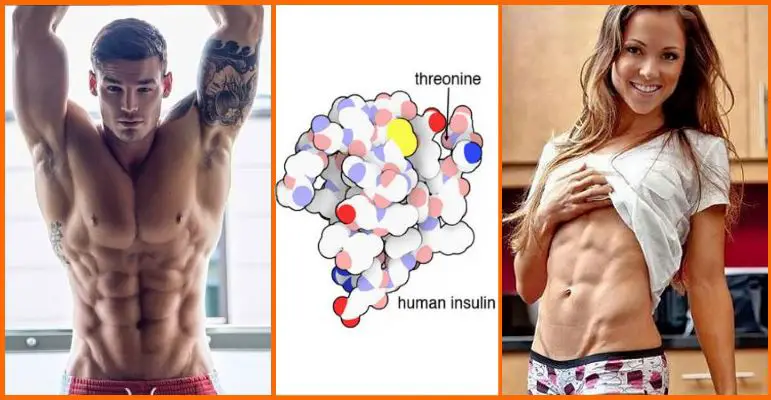Insulin sensitivity is the new hot topic in bodybuilding, and there are some very valid reasons for that. In fact, we’d argue that the most important task of your physical transformation is making your body use insulin as much efficiently as possible.
If you’ve read our articles on the importance of optimizing hormonal production for muscle building, you know that insulin is a hormone with a powerful ability to prevent fat breakdown due to its anabolic properties. And in cases of reduced insulin sensitivity, i.e. insulin resistance, fat loss and size gains are incredibly difficult tasks to accomplish. It’s kind of like having an invisible obstacle – you eat 6 meals per day, train regularly and use all the required supplements, and yet you fail to make any substantial progress and you don’t know why.
Unfortunately, bodybuilders and fitness enthusiasts often overlook the role insulin plays in the body, when in fact, it’s the first thing they need to improve when looking to put on muscle or burn extra fat. When you’re insulin resistant, the body is much more likely to store the food you eat as fat, muscle recovery is slow and athletic performance is suboptimal because of increased fatigue. On top of that, insulin resistance produces inflammation in the body, leading to an increased risk of a variety of chronic diseases.
Therefore, learning how to fully optimize your insulin sensitivity can help improve your health, build more muscle and accelerate fat loss. Bodybuilders choose to live very uncomfortable and challenging lifestyles and their goals demand plenty of patience and dedication, especially when they’re trying to get shredded and build new lean muscle at the same time. There’s a lot to think about, so don’t worry if you’re not getting it right from some aspects.
Here are a few simple everyday tricks that can help you improve your insulin sensitivity and radically increase your gains!
What Is Insulin Sensitivity?
Insulin is secreted by the pancreas, the organ responsible for blood sugar (glucose) regulation. After the meal you’ve eaten is digested, your blood sugar rises. The pancreas then secretes insulin, which binds with the cells in order to store the glucose either in muscle tissue as glycogen, the main energy source for the muscles, or in at cells.
It’s important to note that insulin is sensitive to both carbohydrate and protein consumed, but not fat. However, of all the food sources, it’s the high-carb meals that elevate insulin levels the most. Insulin’s role in the body is protective – body parts use it to rebuild and maintain integrity of internal systems and keep energy stores and an optimum level.
In healthy individuals, the insulin is used to replenish glycogen in muscles first, and the excess glucose ends up stored as fat only after these glycogen reserves are topped off. But when you develop insulin resistance, the cells become unresponsive/insensitive to insulin and aren’t readily binding to it, causing the amount of glucose in the blood to remain high. The body then has to pump out more insulin to transport blood glucose to where it needs to be, and high levels of insulin promote greater fat storage.
So instead of using the glucose metabolized from the food you consume to fuel the work of your muscles, you end up gaining fat.
In this way, insulin sensitivity is defined by how much insulin is needed to store blood glucose within the cells of the body – healthy people need a much smaller amount of insulin to store a certain amount of glucose than insulin resistant individuals, and the latter have higher levels of both blood glucose and insulin. In the long term picture, insulin resistance is linked to obesity, diabetes fatigue, lethargy, poor recovery, extended muscle soreness, increased triglycerides and heart disease, just to name a few.
The Hidden Enemy of Bodybuilding
Besides bringing glucose into all cells in the body, insulin also helps in the uptake of amino acids into muscle tissue, which in turn initiates protein synthesis, and prevents amino acids from being oxidized as a reserve fuel source. So the main reason why bodybuilders need to focus on improving their insulin sensitivity is because without it, their bodies will tend to store more nutrients as fat instead of using them as fuel for the muscles. No fuel, no gains. It’s that simple.
On the other hand, insulin resistance will make fat loss nearly impossible during a shredding phase and you can’t get really lean and stay there unless your insulin sensitivity is in the healthy range. So insulin is crucial for both unlocking new muscle gains and getting to a single-digit body fat.
To boost insulin sensitivity, you need to optimize your nutrition and meal frequency. The general rule of thumb is to divide your total daily calories into 6-7 smaller meals spread throughout the day. Secondly, you want to add high-volume, high-intensity weightlifting, because trained muscle cells are much more insulin sensitive than those that are not. Also, the exact amount of how much glycogen you can store depends upon how much muscle mass you have and how intense your training is.
But proper nutrient timing and intensive resistance training aren’t always enough to bring your insulin sensitivity where it should be – there are a few additional factors that can significantly influence the way your body responds to insulin. Here is how to make the most out of them.

